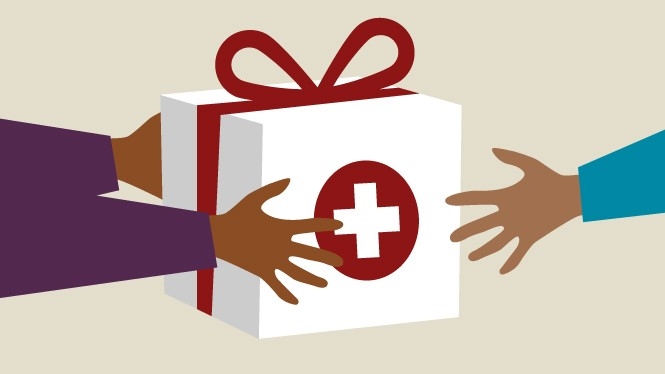You can save a life.
Be an organ donor.
More than 23,000 Californians alone are on the organ transplant waitlist. They live in hope. You can help shorten their wait. Learn about the types of organ, blood, and tissue donors; important donation facts; and the communities where donor shortage is most urgent.
Explore Types of Organ and Tissue Donation
Register to be an organ or tissue donor
Live on in a meaningful way when you give the gift of life to a patient on the transplant waitlist. You can agree to give an organ, part of an organ, blood, or tissue at the time of your death as a deceased organ donor. The organ or organ tissue (heart, lung, kidney, liver, intestines, pancreas, cornea, birth tissue) can be transplanted to another person. For example, 85% of patients on the waitlist are in need of a kidney and 11% are waiting for a liver.1
It is easy to sign up at the DMV or online. Join the organ registry.
Become a living donor for a family member or friend in need
A living donor is when you donate an organ, part of an organ, organ tissue, blood, or bone marrow while you are still alive. You can serve as a living donor for relatives, loved ones, friends, or anonymously for people in need. Stanford Health Care offers guidance and support for living donors. Learn more about being a living donor for the following transplant programs:
Become a living donor for anyone in need
One of the most generous actions volunteers can take is to become a nondirected living organ, blood, or tissue donor. Their organ, organ tissue, blood, or bone marrow will be given to a patient they have never met, someone with an urgent condition. On average, 1 in 4 living donors are not related to the recipient.1 If you are inspired to give a fellow human being a new lease on life, learn about our transplant programs.
Why Become an Organ or Tissue Donor?
Download Facts and FAQs in your preferred language
English | Chinese | Spanish |
Tagalog | Vietnamese
Organ and Tissue Donations:
Heart
Lung
Kidney
Liver
Intestines
Pancreas
Cornea
Birth Tissue
Bone Marrow
There is a critical need for organ, blood, and tissue donors.
A more diverse donor population can lead to increased access to transplants and success
The chance of longer-term survival may improve if a donor and recipient are closely matched by shared genetic background. Compatible blood types and tissue markers are important matching factors and more likely to be found among members of the same race or ethnicity.
More than half the people waiting for life-saving transplants in California are Black, Latinx, Asian, Pacific Islander, and Native American. We have a pressing need for organ and tissue donors from these communities.
Know that Stanford Medicine stands firm in its commitment to humane care and health equity for people of all races, ethnicities, and backgrounds.
Take action to change or save a life
- Every day 20 people die because an organ is not available.2
- In California, Latinos make up 35% of those waiting for life-saving transplants, Asians/Pacific Islanders 16%, and African Americans 14%.3
- Every ten minutes, another person joins the waitlist.4
- 95% of Americans support organ donation but only 58% are registered organ donors.2
- One organ, eye and tissue donor can save and heal as many as 75 patients.5
- A patient might spend up to 10 years on dialysis while waiting for a kidney.6
Organ, Blood, and Tissue Donation Facts
Becoming an organ donor is an important decision. It can be a sensitive subject with many aspects to consider. We invite you to learn the facts about organ, blood, and tissue donation.
Fact: It is important to know that when you are sick or injured, your medical care professionals do not know whether you have registered as an organ donor. They are committed to saving your life. Only in the event of death do they find out if you are an organ donor and notify the organ transplant medical team.
Fact: After death, caring health professionals will determine whether your organs are viable for transplant. If they are, your body will be treated with respect.
Fact: Many religions view organ donation as an act of kindness or consider it a matter of individual conscience. Consult your spiritual advisor.
Fact: Deceased organ donors can have an open-casket funeral if that is their wish and tradition.
Fact: If you are sick or have a condition such as diabetes or cancer, you can still become an organ donor in many cases.
Fact: If you are unhealthy, you can still register as an organ donor.
Fact: People of all ages can consider themselves potential organ donors. We encourage you to register.
Fact: Sexual orientation, gender, gender identity, and gender expression do not prevent you from registering as an organ donor.
If you have more questions about eligibility, visit Frequently Asked Questions at Donate Life America or Fast Facts about Organ Donation at Donate Life California.
If you have questions about becoming a living donor at any time, call our living donor team at:
650-498-7878 for Liver Transplant Program
650-725-9891 for Kidney Transplant Program

Explore organ and tissue transplant programs at Stanford Medicine

Stanford Medicine combines state-of-the-art research, innovative treatments, and comprehensive care. Our transplant programs are limited in our capabilities to provide life-saving transplants due to the number of organs available. Register to be an organ, blood, or tissue donor today.
Learn about our organ and tissue transplant teams, clinical care, and research. Find guidance for patients, families, and living donors.
1 "Living Donation," Donate Life America, accessed March 22, 2022, https://www.donatelife.net/types-of-donation/living-donation/.
2 "Organ Donation Facts and Statistics," Donor Network West, accessed March 22, 2022, https://www.donornetworkwest.org/organ-donation-facts-statistics/.
3 "Facts About Organ and Tissue Donation in California," OneLegacy, accessed March 22, 2022, https://www.onelegacy.org/docs/DLC607_FactsAboutDonation_071009.pdf.
4 "Fast Facts About Organ Donation," Donate Life California, accessed March 22, 2022, https://donatelifecalifornia.org/education/faqs/fast-facts-about-organ-donation/.
5 "Frequently Asked Questions," Donate Life America, accessed March 22, 2022, https://www.donatelife.net/faq/.
6 "Kidney and Pancreas Transplant Program", Stanford Health Care, accessed March, 22, 2022, https://stanfordhealthcare.org/medical-clinics/kidney-transplant-program.html.
